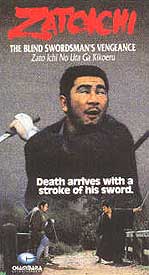 The Blind Swordsman's Vengeance (Zatoichi no uta-ga-kikoeru, 1966) is one of the better episodes, a rich balance of humor, gloom, & violence. Shintaro Katsu in the role of Zatoichi has the ability to tread very near the absurd & still convince the audience every event is plausible & pitiable. The Blind Swordsman's Vengeance (Zatoichi no uta-ga-kikoeru, 1966) is one of the better episodes, a rich balance of humor, gloom, & violence. Shintaro Katsu in the role of Zatoichi has the ability to tread very near the absurd & still convince the audience every event is plausible & pitiable.
Right from the familiar soundtrack with Ichi's theme by Akira Ifukube, the greatest chambara score writer of all time, we know an entertaining film is guaranteed.
Director Tokuzo Tanaka had been helping out on the series almost from the beginning, & would continue to do so even after the long film series came to a close & it became a television series.
The scope cinematography has Kazuo Miyagawa behind the camera, who would later bring beauty to The Trail of Blood trilogy starring Yoshio Harada, & practically defined the look of the genre for the 1960s with Kurosawa on Yojimbo. He was the cinamatogrpher of choice not only for Akira Kurosawa, but also for Yasujiro Ozu, Kon Ichikawa, Kenji Mizoguchi & Masahiro Shinoda.
Before the credits even role, we are introduced to some of the main elements of the whole series, with Ichi defending himself from a group of young gangsters.
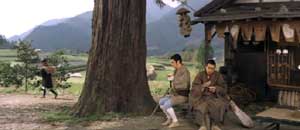 Ichi seems to have a cold, but it doesn't keep him from cutting all his enemies in the blink of an eye, so fast they don't even realize they've been killed. Only when he sneezes do they fall down. Ichi seems to have a cold, but it doesn't keep him from cutting all his enemies in the blink of an eye, so fast they don't even realize they've been killed. Only when he sneezes do they fall down.
The scene wins a laugh, yet it is staged & acted so carefully that we do not mistake it for outright comedy. It is, however, just a little more heartless in its jesting attitude than will be true of the episode in total.
Toward film's end, the menacing Ichi will cofront the evil Boss Gonzo (played by the superb supporting actor Kei Sato). Scruffy, grotesque Ichi laughs & behaves with a facetious politeness, the whole while picking his nose, then mushing a large booger around in his fingers, ultimately flicking it into Boss Gonzo's sake. Gonzo drinks it without noticing the contamination, making a face afterward.
Again, humor verges on slapstick, but really it is a hellish little punishment that Ichi dishes out to the crime boss, egging Gonzo into an attack which ends in instant death even though he attacks, like the coward he will die being, from behind.
Between these two serio-comic scenes of violence are a number of extraordinarily well choreographed fights &, of special merit, some finely drawn characters & a satisfactory story.
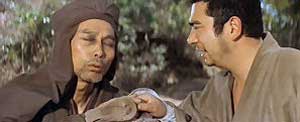 Ichi, entrusted with money from a dying man (Gen Kimura), finds the dead man's little son Taichi, in the town tyranized by Gonzo, & helps the grandparents (Kanae Kobayashi & Koichi Mizuhara) keep their inn which the yakuza gangs wants to take over for gambling. Ichi, entrusted with money from a dying man (Gen Kimura), finds the dead man's little son Taichi, in the town tyranized by Gonzo, & helps the grandparents (Kanae Kobayashi & Koichi Mizuhara) keep their inn which the yakuza gangs wants to take over for gambling.
The little boy is a bit of a snot. He gives Ichi a handful of rocks & convinces him they're candy. Ichi's ability to get along with kids is shown in several episodes.
His relationship with Taiichi is one of the more compelling examples. His grandmother who runs the little inn is a tough old bird, too, who won't bend to the will of gangsters even when they beat her.
The boy is too soon witness to Ichi's remarkable iaijutsu or rapid draw, typical Zatoichi shtick of cutting open a paper lantern held by one of the villains, balancing the clipped candle on the end of his sword, then flicking the candle onto the pate of another of the gangsters. There was definitely an element of his showing off for the small boy's sake.
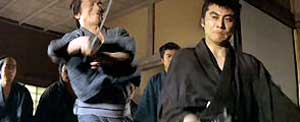 But an aged biwahoshi -- a blind, lute-playing priest, played by Jun Hamamura -- chastises Ichi for making himself such an important factor in the boy's life. He informs Ichi that it is wrong to threaten even bad people with swords, let alone kill them over any provocation. But an aged biwahoshi -- a blind, lute-playing priest, played by Jun Hamamura -- chastises Ichi for making himself such an important factor in the boy's life. He informs Ichi that it is wrong to threaten even bad people with swords, let alone kill them over any provocation.
Sensitive Ichi is easily caused to feel guilty about his life, & so allows himself to be beaten up the next time he is challenged, in particular because Taichi is nearby watching.
It's effective stuff, watching Ichi struggle with his desire to draw his canesword & start slaying, but restrain himself & be humiliated rather than teach the boy that killing solves all problems, or that killers, like himself, are heroes.
The boy, now disillusioned, becomes downcast. But Ichi feels he has done the right thing in not posing as the indestructible avenger.
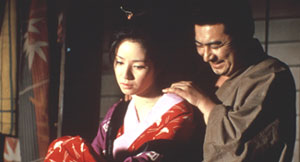 When the inn is next threatened, of course, Ichi does fight, & is soon apologizing to the biwahoshi for his lack of control. In Zen fashion, the biwahoshi completely changes his attitude, saying the right thing to do was to fight. When the inn is next threatened, of course, Ichi does fight, & is soon apologizing to the biwahoshi for his lack of control. In Zen fashion, the biwahoshi completely changes his attitude, saying the right thing to do was to fight.
When Ichi complains about this discrepancy of opinion, the biwahoshi notes that Ichi is merely too stupid to understand that both opinions are correct.
Ichi makes one of his periodic attempts to live without his sword. The blind priest has even suggested Ichi might not be such a lonely man if he can stop living between worlds, outcast among the sighted who look down on him for his handicap, but feared by his blind peers because of his capacity for extreme violence.
"If I have no sword," he admits to himself, "I needn't kill people," & attempts to get by with just a regular cane.
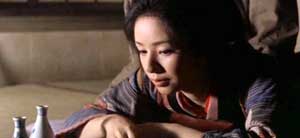 But he finds that he is a very frightened man when unarmed, a poignant realization in this surprisingly sensitive action film: Ichi, apparent superman, is in reality scared of the world's dangers. But he finds that he is a very frightened man when unarmed, a poignant realization in this surprisingly sensitive action film: Ichi, apparent superman, is in reality scared of the world's dangers.
Oshino (Mayumi Ogawa) is the film's heroine. She is calling herself by the name Ocho due to having fallen in life & become a courtesan.
Courtesans can sometimes be one of the more obnoxious stereotypes of chambara cinema, & the Zatoichi series is rarely an exception.
Nevertheless, as played by Mayumi Ogawa, Oshino is given a higher degree of credibility than is usually the case with this stock character. She's world-wise, melancholy, cynical, & good. She transcends the cliche of the hooker with a heart of gold, & her role in feudal Japan is not romanticized.
Even toward the end, when she receives the money required to buy her freedom, there is every indication that she is psychologically trapped in the world she would never have chosen of her own free will, but which after so long she cannot leave by free will either.
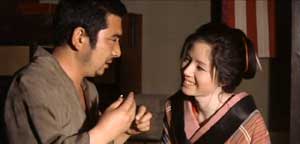 Her fall in life was due to having married a ronin, Genpachiro Kuroda (Shigeru Amachi), who abandoned her because of his drinking problem. Her fall in life was due to having married a ronin, Genpachiro Kuroda (Shigeru Amachi), who abandoned her because of his drinking problem.
When he later overcame his drinking, Oshino was long gone. He spent years trying to find her. On his journeys, he made his living as a cheaply available assassin.
It's within the tragic nature of the series that this ronin is going to have to fight Ichi, though Ichi wants Kuroda to be reuinited with Oshino so they can live happily ever after.
Kuroda's presence in the film represents at least two common but extremely effective elements that recur in the best Zatoichi episodes:
First, Kuroda is a possible equal for Ichi, a worthy opponent. And even though we know Ichi as a series character always wins, the one-on-one duels make for marvelous interludes between his one-against-all slaughterings of unskilled yakuza who always gang up against Ichi in the misguided belief that by sheer numbers they'll be able to kill him.
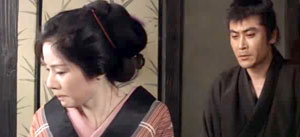 These mass battles are almost eerie, the blind Ichi surrounded by yakuza who fall like sheaves of grain, their swordstyles awkward, Ichi's style rapid & unique. But ideally at some point an individual appears on the scene who is a real character rather than one more blade of grass. These mass battles are almost eerie, the blind Ichi surrounded by yakuza who fall like sheaves of grain, their swordstyles awkward, Ichi's style rapid & unique. But ideally at some point an individual appears on the scene who is a real character rather than one more blade of grass.
The ronin Kuroda stands in stark contrast to the yakuza in scenes of mass carnage, for he has expert training, is a poised & graceful killing machine. He stands tall before hunched Zatoichi who cocks his head from side to side waiting for the attack, aware that this one might not be so easy.
Kuroda though himself a humbled man is yet proud. He has a respectful interest in testing Ichi's muraku-ryu rapid-draw style. It's a worthy duel despite a predictable outcome.
Heroes in Japanese films do commonly lose, & since Ichi as a series character has to win, his opponent is occasionally a hero, too. Kuroda's death by the water is a common chambara image, cliched perhaps, but effective, the water representing life's swift changes & lost fortunes swept away.
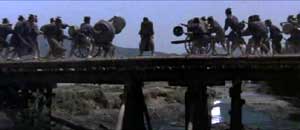 From this comes the second important element of Ichi's most compelling adventures: The tragedy of victoriousness. He has won. He lives. But he has killed someone who was by no means a villain. And his survival at the cost of Kuroda's life has helped doom Oshino as well. From this comes the second important element of Ichi's most compelling adventures: The tragedy of victoriousness. He has won. He lives. But he has killed someone who was by no means a villain. And his survival at the cost of Kuroda's life has helped doom Oshino as well.
The lesson of the biwahoshi -- "We humans are here today, but who knows where we will be tomorrow" -- becomes increasingly poignant after Ichi's sad success & wasteful carnage.
And discovering himself to be a menace even to those he loves, he realizes he is undeserving even of little Taichi's affection, & avoids the boy in order to flee the village toward his next horrific adventure, a lonely man of "the in between" as the biwahoshi observed.
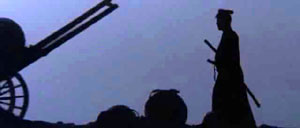 Many Zatoichi episodes include something unusual amidst the fight scenes. Many Zatoichi episodes include something unusual amidst the fight scenes.
The Blind Swordsman's Vengeance uses the gimmick of a mass duel on a bridge with a huge thunderous drum beaten wildly by yakuza hoping to foil Ichi's preternatural abilities by making it impossible for him to hear his attackers.
That battle on the bridge gave the cinematographer an opportunity to really show his stuff, with stunning silhouettes, & portraits of extreme action that evoke Hiroshige wood block prints.
This fine episode additionally decorates itself with moments of traditional Japanese arts. For instance, te blind priest's moving performance on his biwa, & his folksong about life's transient nature, enhance the emotional content of a film that does want to be more than a tale of mindless mayhem.
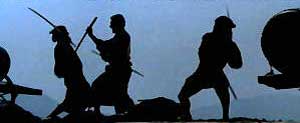 In Voices of the Japanese Cinema Joan Mellen audaciously asserts, "Chambara such as the Zatoichi series lacks depth of commitment & artistic energy" (p25), making me wonder who died & appointed her queen of the artworld. In Voices of the Japanese Cinema Joan Mellen audaciously asserts, "Chambara such as the Zatoichi series lacks depth of commitment & artistic energy" (p25), making me wonder who died & appointed her queen of the artworld.
Commerciality does not need to be artless, & Katsushin's team seriously cared about the quality of this series. Art does not have to be stodgy & tedius & uninteresting to the plebian masses whose preference the likes of Mellen has imagined as ignorant & devoid of taste.
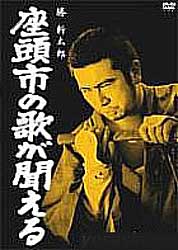 By way of closing footnotes, occasionally in Ichi episodes we are given bits of information about his childhood & youth. Anyone attempting to track these bits of biography will find bewildering contradictions. By way of closing footnotes, occasionally in Ichi episodes we are given bits of information about his childhood & youth. Anyone attempting to track these bits of biography will find bewildering contradictions.
In this film the biwahoshi guesses that Ichi could see until he was five or six years old, & Ichi is surprised by the correct guess.
Yet in the very first Zatoichi film, we learn that he fell in love & was going to get married before he started to lose his sight, & as a result lost his fiance who did not want to be the wife of a blind man.
In yet another film he claimed to remember seeing the sun when he was very small, though in another he claimed to have been born blind & never knew what his mother looked like, recognizing her exclusively by her scent.
Rather than blame these contradictions on screenwriter's failure of continuity film to film, I like to think of Ichi as a man shaping & reshaping his history, not as a liar, but as someone orphaned when little & never completely certain about where he has been in his life, or where it will next take him.
copyright © by Paghat the Ratgirl
|
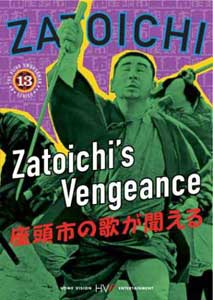

 Ichi seems to have a cold, but it doesn't keep him from cutting all his enemies in the blink of an eye, so fast they don't even realize they've been killed. Only when he sneezes do they fall down.
Ichi seems to have a cold, but it doesn't keep him from cutting all his enemies in the blink of an eye, so fast they don't even realize they've been killed. Only when he sneezes do they fall down.
 But an aged biwahoshi -- a blind, lute-playing priest, played by Jun Hamamura -- chastises Ichi for making himself such an important factor in the boy's life. He informs Ichi that it is wrong to threaten even bad people with swords, let alone kill them over any provocation.
But an aged biwahoshi -- a blind, lute-playing priest, played by Jun Hamamura -- chastises Ichi for making himself such an important factor in the boy's life. He informs Ichi that it is wrong to threaten even bad people with swords, let alone kill them over any provocation.
 But he finds that he is a very frightened man when unarmed, a poignant realization in this surprisingly sensitive action film: Ichi, apparent superman, is in reality scared of the world's dangers.
But he finds that he is a very frightened man when unarmed, a poignant realization in this surprisingly sensitive action film: Ichi, apparent superman, is in reality scared of the world's dangers. Her fall in life was due to having married a ronin, Genpachiro Kuroda (Shigeru Amachi), who abandoned her because of his drinking problem.
Her fall in life was due to having married a ronin, Genpachiro Kuroda (Shigeru Amachi), who abandoned her because of his drinking problem. These mass battles are almost eerie, the blind Ichi surrounded by yakuza who fall like sheaves of grain, their swordstyles awkward, Ichi's style rapid & unique. But ideally at some point an individual appears on the scene who is a real character rather than one more blade of grass.
These mass battles are almost eerie, the blind Ichi surrounded by yakuza who fall like sheaves of grain, their swordstyles awkward, Ichi's style rapid & unique. But ideally at some point an individual appears on the scene who is a real character rather than one more blade of grass. From this comes the second important element of Ichi's most compelling adventures: The tragedy of victoriousness. He has won. He lives. But he has killed someone who was by no means a villain. And his survival at the cost of Kuroda's life has helped doom Oshino as well.
From this comes the second important element of Ichi's most compelling adventures: The tragedy of victoriousness. He has won. He lives. But he has killed someone who was by no means a villain. And his survival at the cost of Kuroda's life has helped doom Oshino as well.
 In Voices of the Japanese Cinema Joan Mellen audaciously asserts, "Chambara such as the Zatoichi series lacks depth of commitment & artistic energy" (p25), making me wonder who died & appointed her queen of the artworld.
In Voices of the Japanese Cinema Joan Mellen audaciously asserts, "Chambara such as the Zatoichi series lacks depth of commitment & artistic energy" (p25), making me wonder who died & appointed her queen of the artworld. By way of closing footnotes, occasionally in Ichi episodes we are given bits of information about his childhood & youth. Anyone attempting to track these bits of biography will find bewildering contradictions.
By way of closing footnotes, occasionally in Ichi episodes we are given bits of information about his childhood & youth. Anyone attempting to track these bits of biography will find bewildering contradictions.